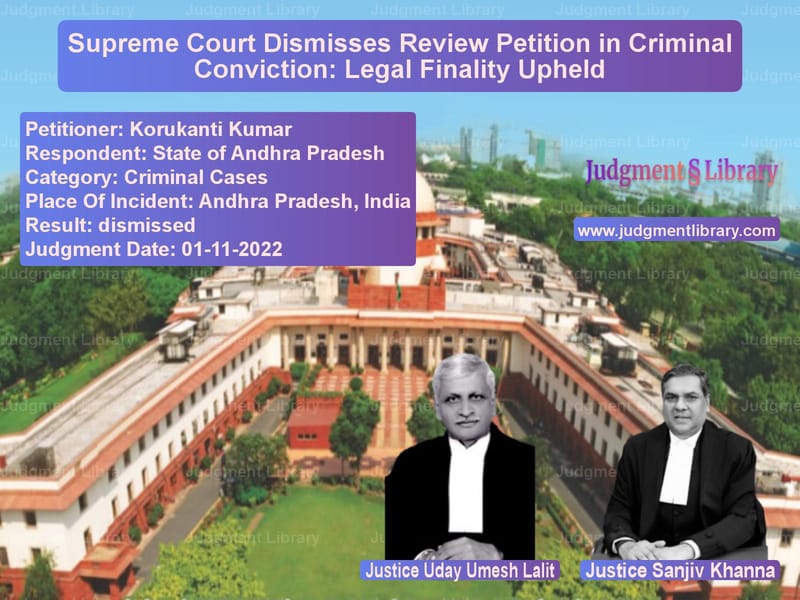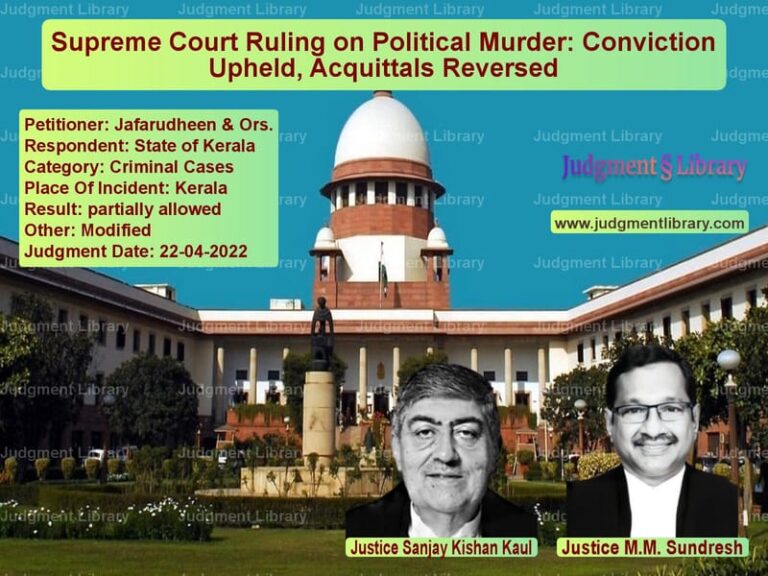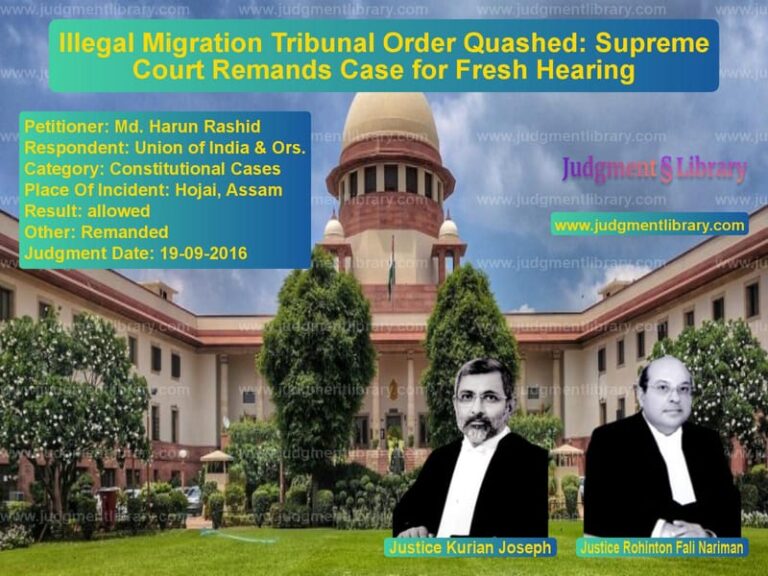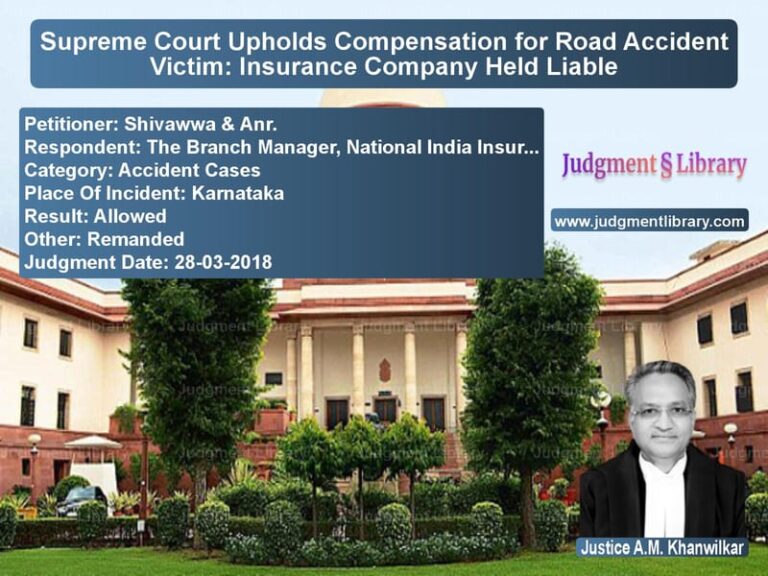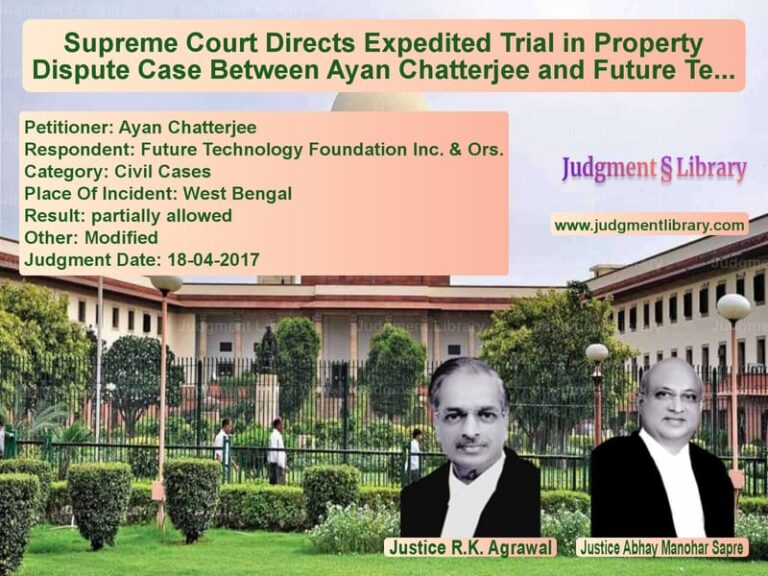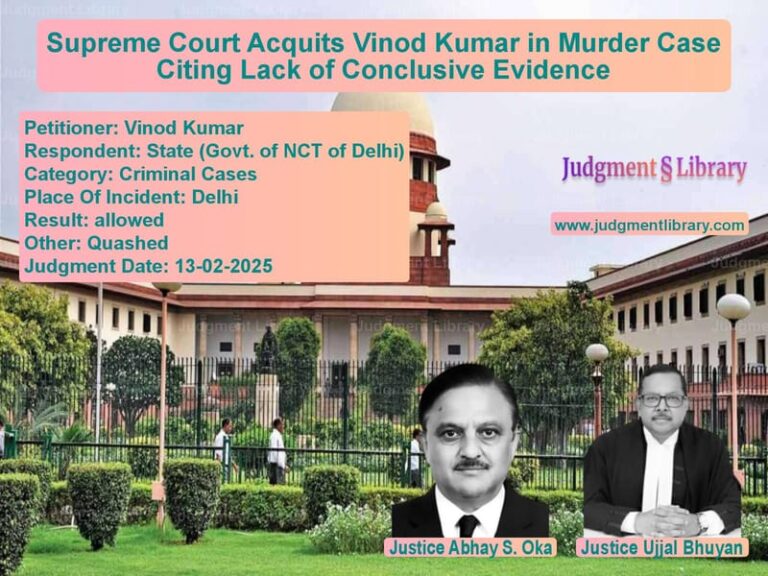Supreme Court Dismisses Review Petition in Criminal Conviction: Legal Finality Upheld
The Supreme Court of India recently ruled on a significant review petition in the case of Korukanti Kumar v. State of Andhra Pradesh. The petitioner had been convicted under Sections 376, 302, and 309 of the Indian Penal Code (IPC) for offenses including rape, murder, and an attempt to commit suicide. The case highlights the strict criteria under which a review petition can be entertained and the principles governing the finality of criminal convictions.
Background of the Case
The petitioner, Korukanti Kumar, was charged and convicted for committing heinous crimes, including sexual assault and murder. The Trial Court, after examining forensic evidence, medical reports, and witness testimonies, found him guilty and sentenced him accordingly. The High Court upheld this conviction on appeal, reinforcing the Trial Court’s findings.
Following the High Court’s decision, the petitioner filed a Special Leave Petition (SLP) before the Supreme Court. However, after due consideration, the SLP was dismissed, solidifying the conviction. The petitioner then filed a review petition challenging the Supreme Court’s dismissal of the SLP, arguing that the conviction suffered from legal and evidentiary errors.
Legal Issues Before the Court
The key legal questions that the Supreme Court had to determine in the review petition were:
- Whether the conviction suffered from an error apparent on the face of the record, warranting interference under review jurisdiction.
- Whether the Trial Court and the High Court had overlooked crucial evidence that could have altered the outcome of the case.
- Whether a review petition can be used as an alternative to an appeal or a second round of reconsideration of the same evidence.
Petitioner’s Arguments
In seeking a review, the petitioner argued:
- The prosecution’s case was based primarily on circumstantial evidence, which did not conclusively establish guilt beyond a reasonable doubt.
- The medical evidence was inconclusive and did not directly link the accused to the crime.
- There were discrepancies in witness statements that were not adequately addressed by the lower courts.
- The petitioner was denied the opportunity to present exculpatory evidence that could have proved his innocence.
- The punishment imposed was excessively harsh, considering the mitigating circumstances.
Respondent’s Arguments
The State of Andhra Pradesh, representing the prosecution, defended the conviction and argued:
- The conviction was based on substantial and corroborative evidence, including forensic reports, medical findings, and credible witness testimonies.
- The Trial Court and the High Court both examined the facts extensively before affirming guilt beyond a reasonable doubt.
- The review petition did not present any new legal argument or factual error warranting reconsideration.
- The Supreme Court, having dismissed the SLP, had already endorsed the findings of the lower courts.
- Review jurisdiction is strictly limited and does not allow for a rehearing of the case on merits.
Supreme Court’s Observations
The Supreme Court, after examining the grounds raised in the review petition, made the following observations:
- The review jurisdiction of the Supreme Court is strictly confined to cases where there is an error apparent on the face of the record.
- The petitioner’s arguments were largely a repetition of those made in the Special Leave Petition, which had already been dismissed.
- The conviction was supported by substantial evidence, and the courts below had provided well-reasoned justifications for their conclusions.
- There was no material irregularity or miscarriage of justice that would necessitate interference through review.
- The plea that the punishment was excessive was not a valid ground for review.
The Court reaffirmed the settled principle that review petitions are not an opportunity for a fresh round of litigation but are meant to correct glaring errors if any exist.
Supreme Court’s Verdict
The Supreme Court, comprising Chief Justice Uday Umesh Lalit and Justice Sanjiv Khanna, dismissed the review petition with the following remarks:
- “We have gone through the grounds raised in the Review Petition and do not find any error apparent on record to justify interference.”
- “This Review Petition is, therefore, dismissed.”
With this dismissal, the conviction and sentence imposed on the petitioner remain unchanged, bringing the legal proceedings to a final conclusion.
Legal Principles Reaffirmed by the Judgment
The Supreme Court’s ruling reinforces several important legal principles:
- Finality of Criminal Convictions: Once the Supreme Court dismisses an SLP, a review petition will only be entertained in rare and exceptional circumstances.
- Strict Standards for Review: Review jurisdiction is not meant to reargue the case but is limited to correcting errors that are manifestly evident.
- Role of Circumstantial Evidence: The Court reiterated that circumstantial evidence, if well-supported and corroborated, can form the basis of a conviction.
- Limited Scope of Judicial Intervention: The judiciary cannot allow endless litigation through repeated review attempts when the conviction is well-founded.
Implications of the Judgment
This ruling has far-reaching consequences for criminal law and judicial review processes:
- It sets a precedent for limiting the misuse of review petitions in criminal cases.
- It reinforces the importance of finality in criminal proceedings to ensure swift justice.
- It clarifies the role of circumstantial evidence in securing convictions when direct evidence is unavailable.
- It prevents the review jurisdiction from becoming a means to reopen settled cases without valid justification.
Conclusion
The Supreme Court’s decision in Korukanti Kumar v. State of Andhra Pradesh serves as a strong reaffirmation of judicial discipline in reviewing criminal convictions. The judgment ensures that review petitions cannot be used as an alternative to appeal or as a delaying tactic in criminal proceedings. By upholding the principles of finality and strict judicial scrutiny in review petitions, the Court has reinforced the integrity of the legal process and the sanctity of criminal justice.
Petitioner Name: Korukanti Kumar.Respondent Name: State of Andhra Pradesh.Judgment By: Justice Uday Umesh Lalit, Justice Sanjiv Khanna.Place Of Incident: Andhra Pradesh, India.Judgment Date: 01-11-2022.
Don’t miss out on the full details! Download the complete judgment in PDF format below and gain valuable insights instantly!
Download Judgment: korukanti-kumar-vs-state-of-andhra-prad-supreme-court-of-india-judgment-dated-01-11-2022.pdf
Directly Download Judgment: Directly download this Judgment
See all petitions in Murder Cases
See all petitions in Rape Cases
See all petitions in Bail and Anticipatory Bail
See all petitions in Judgment by Uday Umesh Lalit
See all petitions in Judgment by Sanjiv Khanna
See all petitions in dismissed
See all petitions in supreme court of India judgments November 2022
See all petitions in 2022 judgments
See all posts in Criminal Cases Category
See all allowed petitions in Criminal Cases Category
See all Dismissed petitions in Criminal Cases Category
See all partially allowed petitions in Criminal Cases Category

